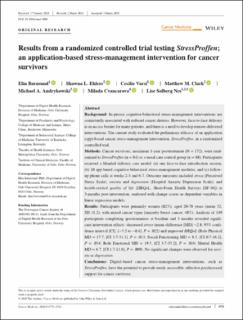Results from a randomized controlled trial testing StressProffen; an application‐based stress‐management intervention for cancer survivors
| dc.contributor.author | Børøsund, Elin | |
| dc.contributor.author | Ehlers, Shawna | |
| dc.contributor.author | Varsi, Cecilie | |
| dc.contributor.author | Clark, Matthew M. | |
| dc.contributor.author | Andrykowski, Michael A. | |
| dc.contributor.author | Cvancarova, Milada | |
| dc.contributor.author | Nes, Lise Solberg | |
| dc.coverage.spatial | Norway | en_US |
| dc.date.accessioned | 2021-06-11T13:05:32Z | |
| dc.date.available | 2021-06-11T13:05:32Z | |
| dc.date.created | 2020-05-26T13:39:52Z | |
| dc.date.issued | 2020-04-03 | |
| dc.identifier.citation | Cancer Medicine. 2020, 9 (11), 3775-3785). | en_US |
| dc.identifier.issn | 2045-7634 | |
| dc.identifier.uri | https://hdl.handle.net/11250/2759013 | |
| dc.description.abstract | Background: In-person cognitive-behavioral stress-management interventions are consistently associated with reduced cancer distress. However, face-to-face delivery is an access barrier for many patients, and there is a need to develop remote-delivered interventions. The current study evaluated the preliminary efficacy of an application (app)-based cancer stress-management intervention, StressProffen, in a randomized controlled trial. Methods: Cancer survivors, maximum 1-year posttreatment (N = 172), were randomized to StressProffen (n = 84) or a usual care control group (n = 88). Participants received a blended delivery care model: (a) one face-to-face introduction session, (b) 10 app-based cognitive-behavioral stress-management modules, and (c) follow-up phone calls at weeks 2-3 and 6-7. Outcome measures included stress (Perceived Stress Scale), anxiety and depression (Hospital Anxiety Depression Scale), and health-related quality of life (HRQoL; Short-Form Health Surveys [SF-36]) at 3-months post-intervention, analyzed with change scores as dependent variables in linear regression models. Results: Participants were primarily women (82%), aged 20-78 years (mean 52, SD 11.2), with mixed cancer types (majority breast cancer; 48%). Analysis of 149 participants completing questionnaires at baseline and 3 months revealed significant intervention effects: decreased stress (mean difference [MD] −2.8; 95% confidence interval [CI], [−5.2 to −0.4]; P = .022) and improved HRQoL (Role Physical MD = 17.7, [CI 3.7-31.3], P = .013; Social Functioning MD = 8.5, [CI 0.7-16.2], P = .034; Role Emotional MD = 19.5, [CI 3.7-35.2], P = .016; Mental Health MD = 6.7, [CI 1.7-11.6], P = .009). No significant changes were observed for anxiety or depression. Conclusions: Digital-based cancer stress-management interventions, such as StressProffen, have the potential to provide easily accessible, effective psychosocial support for cancer survivors. | en_US |
| dc.language.iso | eng | en_US |
| dc.publisher | Wiley | en_US |
| dc.relation.ispartofseries | Cancer Medicine;volume 9. issue 11 | |
| dc.rights | Navngivelse 4.0 Internasjonal | * |
| dc.rights.uri | http://creativecommons.org/licenses/by/4.0/deed.no | * |
| dc.subject | Cancer | en_US |
| dc.subject | Cancer survivors | en_US |
| dc.subject | Distress | en_US |
| dc.subject | Health-care delivery | en_US |
| dc.subject | Psycho-oncology | en_US |
| dc.subject | Stress-management | en_US |
| dc.title | Results from a randomized controlled trial testing StressProffen; an application‐based stress‐management intervention for cancer survivors | en_US |
| dc.type | Peer reviewed | en_US |
| dc.type | Journal article | en_US |
| dc.description.version | publishedVersion | en_US |
| dc.rights.holder | © 2020 The Authors. | en_US |
| cristin.ispublished | true | |
| cristin.fulltext | original | |
| cristin.qualitycode | 1 | |
| dc.identifier.doi | https://doi.org/10.1002/cam4.3000 | |
| dc.identifier.cristin | 1812665 | |
| dc.source.journal | Cancer Medicine | en_US |
| dc.source.volume | 9 | en_US |
| dc.source.issue | 11 | en_US |
| dc.source.pagenumber | 10 | en_US |
| dc.relation.project | Kreftforeningen: 4602492-2013 | en_US |
Files in this item
This item appears in the following Collection(s)
-
HV - Institutt for sykepleie og helsefremmende arbeid [1386]
HV - Department of Nursing and Health Promotion -
Publikasjoner fra Cristin [3198]

